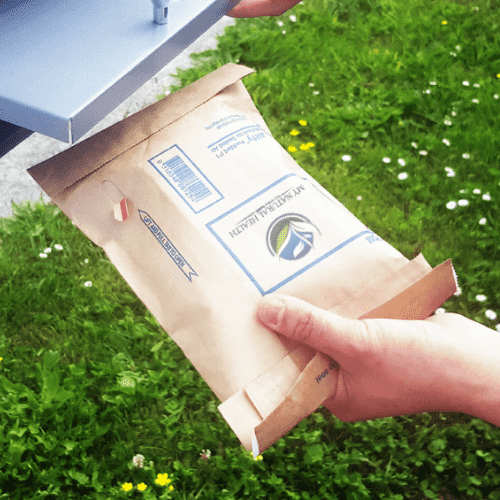Very impressed, super quick delivery (arrived day after ordered and this was to a rural address!) and very competitive prices. Would very highly recommend to anyone looking for a company that ticks all the boxes![]()
This article appeared in The Food matters website http://www.foodmatters.tv/ By Laura Weldon Ever heard the word "locavore?" This was the New American Dictionary word of the year for 2007. A locavore is a person who chooses to eat food that has been grown and produced locally. Why go to all that trouble? Save energy and reduce your carbon footprint Food travels an average of 1,500 miles before reaching the consumer's fork. Combination foods travel even farther. One study found that the sugar, yogurt and strawberries in fruit yogurt travelled over 2,200 miles. Buying locally can slash these numbers by more than 90 percent. It isn't hard to buy local yogurt, honey and fruit to mix up a homemade snack. This also cuts down on global warming gasses, making the end product more sustainable. Preserve flavor Because today's crops are grown to be shipped long distances, growers plant varieties that will survive transport best. That means the peaches are not grown for flavor but hardiness, the tomatoes are chosen for their thick skins and standardized size. Growers pick produce long before natural ripening. The taste suffers even more during cold storage and shipping. As a result, who really wants to eat the cardboard-like fruits and vegetables available most of the year at the supermarket?
Few of us know what straight-off-the-vine grapes taste like, not many of us have ever tried freshly picked sweet corn or cherries still warm from the sun. But when you buy locally, you get a powerhouse of flavor. Farmers can pick the fruits and vegetables at peak ripeness because their customers are an hour or two away. Gain nutrients According to USDA data, random samples of fruits and vegetables show 26 percent less calcium, 36 percent less iron and 29 percent less vitamin C compared to 1975. Not only do food crops need to reach peak nutritional levels by fully ripening on the plant, recent studies have shown that organic farming methods lead to improved nutrient levels. A four year, 25 million dollar study conducted by researchers at the Tesco Centre for Organic Agriculture at Newcastle University, United Kingdom found that organically grown foods contain higher levels of cancer fighting and heart healthy antioxidants. The study concluded that, compared to standard commercially grown fruits and vegetables, organic produce has on average 40 percent more antioxidants. Other studies have shown similar results for animal products. Preserve family farms For every dollar spent on food, approximately a dime goes to the farmer. The remaining 90 cents has a lot to do with profits made by corporations when wholesome foods are converted into high calorie, low-nutrient products. Local growers who find direct sales for their products with restaurateurs, farmers' markets and grocers can get full retail price for their food, meaning they can afford to remain on the land. This maintains the bedrock lifestyle that formed this country. Only one percent of Americans now farm as their primary occupation.
Get to know the farmers who grow your food when you join a CSA, buy on the farm or see the growers week after week at market stands. You can ask questions about how your food has been grown, find out how to prepare it and learn what it takes to support non-industrialized food in this country. Help your local economy Money spent on processed foods and products produced elsewhere does little to sustain your local economy. One study followed the funds spent on food as it persisted in the local economy. It was found that a dollar spent at a supermarket was less than half as valuable in local reinvestment as one spent with an area grower or producer. You also build an invisible economy of connections, people to people, when you are committed to buying locally. Once you are a regular customer at a locally owned bakery, participate in community gardening, and meet up with the same folks each week at a farmers' market, you'll get to know people who live by similar values. These ties support and sustain communities. Understand ecosystems By voting with your dollar for locally and often organically grown foods you are swaying the marketplace towards sustainable agricultural practices. Such practices include erosion control, cover crops, windbreaks and habitats for natural pollinators. You are proactively making a difference in supporting viable land use.. Save genetic diversity While commercial agribusiness relies on a limited number of seed varieties, often genetically modified and patented, local farms can grow any of thousands of varieties passed down for generations. These hardy stocks provide more than flavour and disease resistance, they also are genetically diverse.
The potato famine in Ireland taught farmers to use diverse varieties to prevent tragedy. The new seed varieties of agribusiness do not permit diversity nor seed saving. Heirloom varieties are natural insurance for a changing climate and altering global conditions. They also give us a gift of wonderful taste since we are accustomed to the same few varieties. Ever try Wren's Egg beans, Noir des Carmes melons or Tolman Sweet apples? There are literally thousands of heirloom fruits, vegetables, nuts and grains grown on small farms. How does one get started? The concept may seem daunting at first. There's no need to jump in full force. Rather than an all or nothing approach, do what you can and increase your commitment as your comfort level grows. 1. One product at a time. If you are accustomed to a diet of convenience foods then take it in moderation. Every time you shop, replace a category of food on your list that is provided by a distant corporate entity with a local provider. If you normally buy bread from a corporate conglomerate, start buying it locally or make it yourself. In another week or two when you are at ease with that change, make another change.
Eventually your shift to local food will be complete without disruption or difficulty. 2. Try something new. Explore farmers' markets, the offerings from ethnic restaurants and new ideas from slow food cookbooks. Oftentimes if you are a member of a CSA, you'll find yourself with an abundance of something you haven't used before. A bumper crop of butternut squash will help you discover curried soups and casseroles you hadn't imagined before you had to deal with this nutrient-packed treasure. 3. Preserve. When you have extra you'll find it worthwhile to freeze, can or dry. You'll notice it is also helpful to double recipes so you can make your efforts worthwhile. Try getting together with friends to make spaghetti sauce, chutney or pies. The results can be an excuse for a party or give you plenty to use later. 4. Share the pleasure. Join or create a network of others who appreciate local food and/or slow food, (www.slowfoodusa.org). 5. Proceed wisely. Become acquainted with growing times and growers.
Once you are familiar with ripening schedules for raspberries, tomatoes, eggplant and your other favourites, get to know local growers by visiting farm stands, farmers' markets and orchards. You can get better prices by buying in bulk, going to pick-your-own farms, asking for seconds (smaller apples, oddly sized potatoes, etc) and bidding at produce auctions. 6. Start a garden. Homesteaders have been eating local food for years and community gardeners haven't been far behind. If you don't have the space for your own garden, locate one near you through the American Community Gardening Association, (http://www.communitygarden.org/). 7. Curl up with a book. A number of books on the concept of local eating have sprouted on the bestseller lists. Try "The 100-Mile Diet: A Year of Local Eating" by Alisa Smith and J.B. Mackinnon, "Coming Home to Eat: The Pleasures and Politics of Local Foods" by Gary Paul Nabhan, or "Animal, Vegetable, Miracle" by Barbara Kingsolver. Buying local food brings the solution back home. It doesn't assume that corporate or political answers will provide the solution. Polls show a majority of us care deeply about the environment and health. Now our day-to-day decisions are beginning to reflect this consciousness. Each time a choice is made to eat healthy, locally grown food we put sustainability on the menu. Source: www.naturalnews.com
Comments on this post
There are no comments on this post... be the first to place a comment!




















.png)